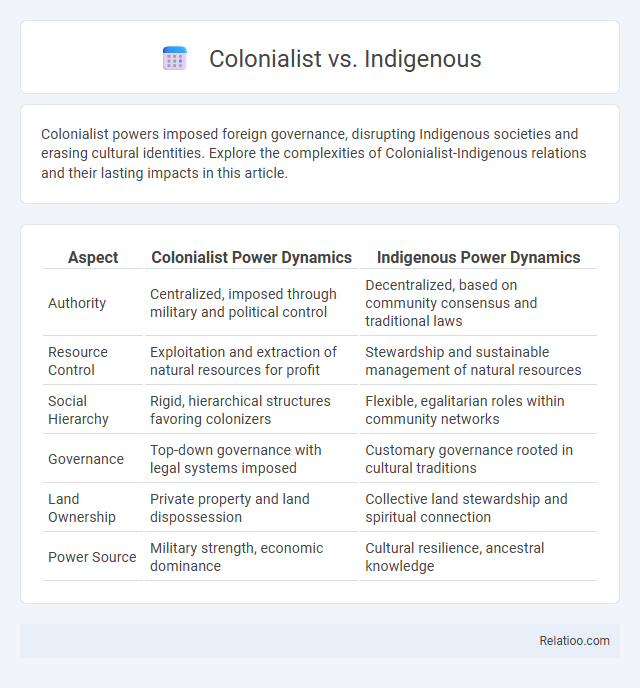Colonialist powers imposed foreign governance, disrupting Indigenous societies and erasing cultural identities. Explore the complexities of Colonialist-Indigenous relations and their lasting impacts in this article.
Table of Comparison
| Aspect | Colonialist Power Dynamics | Indigenous Power Dynamics |
|---|---|---|
| Authority | Centralized, imposed through military and political control | Decentralized, based on community consensus and traditional laws |
| Resource Control | Exploitation and extraction of natural resources for profit | Stewardship and sustainable management of natural resources |
| Social Hierarchy | Rigid, hierarchical structures favoring colonizers | Flexible, egalitarian roles within community networks |
| Governance | Top-down governance with legal systems imposed | Customary governance rooted in cultural traditions |
| Land Ownership | Private property and land dispossession | Collective land stewardship and spiritual connection |
| Power Source | Military strength, economic dominance | Cultural resilience, ancestral knowledge |
Historical Context: Defining Colonialism and Indigenous Perspectives
Colonialism historically involved the establishment of foreign control over Indigenous lands through settlement, resource extraction, and cultural domination, often justified by notions of superiority and entitlement. Indigenous perspectives emphasize the disruption of traditional societies, loss of sovereignty, and enduring resilience against exploitation rooted in colonial systems. The historical context reveals a complex power dynamic where colonial exploitation extracted wealth and imposed legal frameworks, while Indigenous peoples continuously resisted to preserve their identities and rights.
Early Encounters: Initial Interactions and Power Dynamics
Early encounters between colonialists and Indigenous peoples were marked by complex power dynamics, where European colonizers often imposed military and economic dominance to exploit land and resources. These interactions included unequal exchanges, with Indigenous knowledge frequently appropriated while their social structures were undermined. The exploitation during these initial contacts laid the groundwork for systemic displacement and long-term cultural and economic marginalization of Indigenous communities.
Land Appropriation: Dispossession and Territorial Loss
Colonialist practices systematically enforce land appropriation, resulting in the dispossession and territorial loss of Indigenous communities. Your understanding of these processes highlights the critical impact of forced displacement, resource extraction, and legal mechanisms that strip Indigenous peoples of their ancestral lands. This exploitation perpetuates social and economic inequalities, eroding Indigenous sovereignty and cultural heritage.
Cultural Suppression: Erasure of Indigenous Languages and Traditions
Colonialist practices have systematically suppressed Indigenous cultures by eradicating native languages and traditions, leading to a profound loss of identity and heritage. Exploitation under colonial rule often involved enforced assimilation policies, such as residential schools, which disrupted the transmission of Indigenous knowledge across generations. This cultural erasure undermines Indigenous sovereignty and perpetuates social and psychological harm within communities.
Resistance and Rebellion: Indigenous Responses to Colonization
Indigenous resistance to colonization manifested through diverse forms of rebellion, ranging from armed uprisings to cultural preservation and revitalization efforts. These acts of defiance directly challenged colonial exploitation and sought to reclaim autonomy, land, and identity. Historical examples include the Pueblo Revolt of 1680 and the ongoing sovereignty movements that emphasize indigenous rights and environmental stewardship.
Legal Systems: Imposed Laws vs. Traditional Governance
Colonialist legal systems often imposed foreign laws prioritizing property rights and state control, undermining Indigenous governance rooted in communal land stewardship and customary law. Traditional Indigenous legal frameworks emphasize restorative justice, collective responsibility, and sustainable resource management, contrasting sharply with colonial courts focused on punishment and individual ownership. This legal imposition facilitated exploitation by delegitimizing Indigenous authority and enabling resource extraction under colonial jurisdiction.
Resource Exploitation: Economic Impact on Indigenous Communities
Resource exploitation driven by colonialist practices has historically undermined Indigenous communities' economic stability by appropriating land and natural wealth without fair compensation. Your economic opportunities are often limited due to environmental degradation and loss of access to traditional resources essential for livelihood. This exploitation perpetuates systemic poverty and obstructs Indigenous self-determination in economic development.
Social Stratification: Racial Hierarchies and Identity
Social stratification under colonialism imposed rigid racial hierarchies that privileged colonialist identities while marginalizing Indigenous populations, often defining social status and access to resources based on race. Exploitation entrenched these hierarchies by systematically subordinating Indigenous communities through economic control, cultural suppression, and denied political power. Your understanding of these dynamics reveals how identity and racial categories were manipulated to maintain dominance and justify inequality.
Contemporary Reconciliation: Efforts Toward Justice and Healing
Contemporary reconciliation efforts address the historical and ongoing exploitation experienced by Indigenous peoples due to colonialist policies and actions, emphasizing justice and healing through formal apologies, land reparations, and cultural revitalization programs. Governments and organizations increasingly prioritize Indigenous sovereignty and equitable resource sharing to dismantle systemic inequalities perpetuated by colonialism. Truth and reconciliation commissions play a pivotal role in acknowledging harms, fostering dialogue, and guiding policies that support sustainable Indigenous self-determination and social equity.
Future Directions: Building Equitable Relationships
Future directions in addressing colonialism and exploitation emphasize fostering equitable relationships by prioritizing Indigenous sovereignty, cultural preservation, and collaborative decision-making. Empowering Indigenous communities through legal recognition, economic opportunities, and inclusion in policy frameworks is essential for dismantling exploitative structures. Sustained efforts must focus on restorative justice and mutual respect to create a foundation for genuine partnership and shared prosperity.

Infographic: Colonialist vs Indigenous
 relatioo.com
relatioo.com